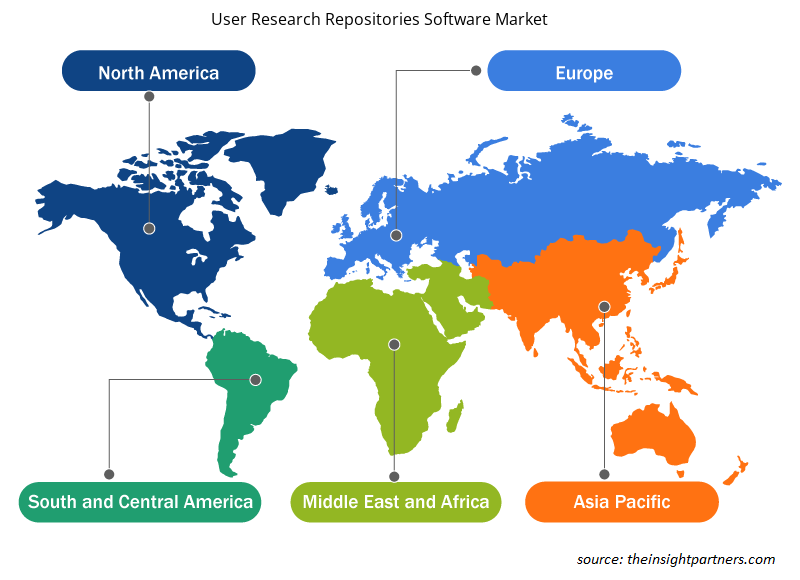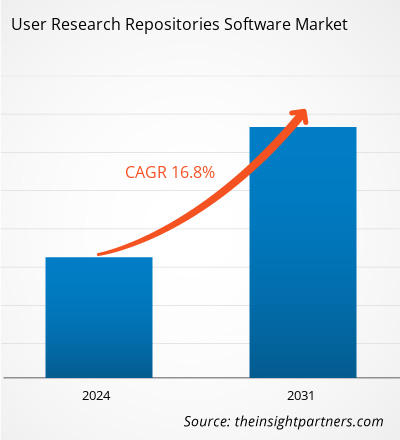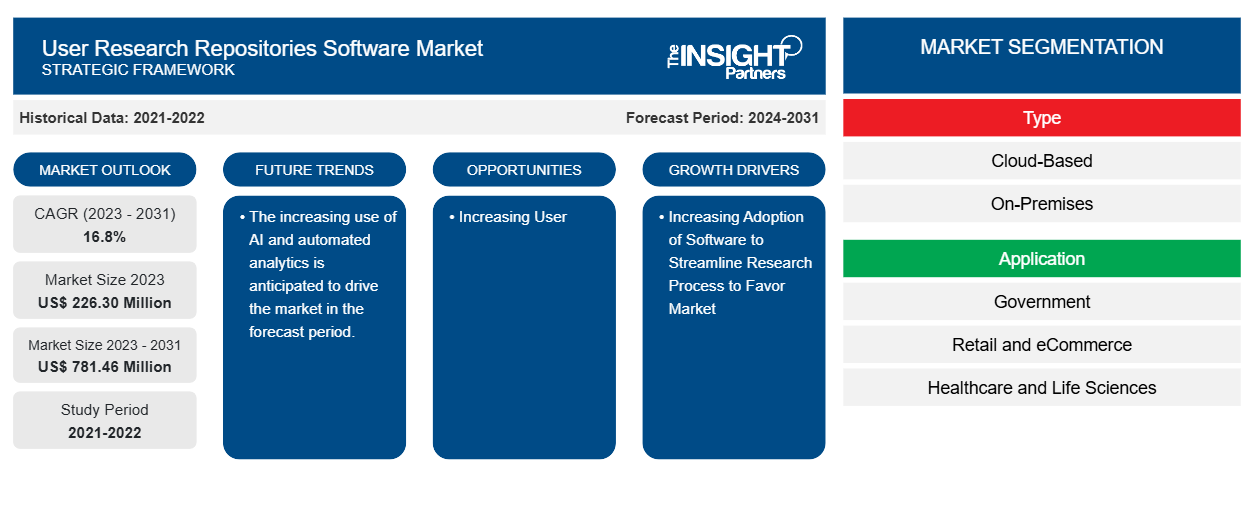Der Markt für Software für Benutzerforschungs-Repositorys soll von 226,30 Millionen US-Dollar im Jahr 2023 auf 781,46 Millionen US-Dollar im Jahr 2031 anwachsen. Der Markt soll zwischen 2023 und 2031 eine durchschnittliche jährliche Wachstumsrate (CAGR) von 16,8 % verzeichnen. Die zunehmende Nutzung von Software zur Rationalisierung des Forschungsprozesses und die steigende Nachfrage von UX-Tech-Startups dürften die wichtigsten Treiber und Trends des Marktes sein.
Marktanalyse für User Research Repositories-Software
Das Wachstum des Marktes für Software für Benutzerforschungs-Repositorys ist auf die zunehmende Nutzung von Software zur Optimierung des Forschungsprozesses und die steigende Nachfrage von UX-Tech-Startups zurückzuführen. Darüber hinaus sind der Anstieg der digitalen Erfahrungsdaten der Benutzer und die Verwendung von KI und Analysen weitere Faktoren, die das Wachstum des Marktes für Handelsförderungsmanagement-Software fördern.
Marktübersicht für User Research Repositories-Software
Ein User Research Repository ist eine zentrale Datenbank, die alle Ihre User Research-Daten, UX-Forschungsberichte und Artefakte enthält. Verschiedene Teams – wie Design, Produkt, Vertrieb und Marketing – können Erkenntnisse aus früheren Projekten gewinnen, um aktuelle Szenarien zu kontextualisieren und fundierte Entscheidungen zu treffen.
Passen Sie diesen Bericht Ihren Anforderungen an
Sie erhalten kostenlose Anpassungen an jedem Bericht, einschließlich Teilen dieses Berichts oder einer Analyse auf Länderebene, eines Excel-Datenpakets sowie tolle Angebote und Rabatte für Start-ups und Universitäten.
-
Holen Sie sich die wichtigsten Markttrends aus diesem Bericht.Dieses KOSTENLOSE Beispiel umfasst eine Datenanalyse von Markttrends bis hin zu Schätzungen und Prognosen.
Treiber und Chancen auf dem Markt für Software zur Repository für Benutzerforschung
Zunehmende Nutzung von Software zur Optimierung des Forschungsprozesses zugunsten des Marktes
Software für Forschungsrepositorys kann die Effizienz erheblich steigern, indem sie Daten organisiert, Arbeitsabläufe optimiert und den Zeitaufwand für manuelle Aufgaben reduziert. Dies macht den Forschungsprozess schneller und produktiver. Darüber hinaus wird mit zunehmendem Volumen an Forschungsdaten der Bedarf an effektiven Datenverwaltungslösungen immer größer. Software für Forschungsrepositorys hilft dabei, große Datenmengen einfach zu speichern, zu organisieren und abzurufen.
Verbesserung des digitalen Benutzererlebnisses.
Da digitale Erlebnisse immer komplexer und persönlicher werden, benötigen Unternehmen tiefere Einblicke in das Nutzerverhalten und die Präferenzen. Repositorien für die Benutzerforschung helfen dabei, diese Daten effektiv zu konsolidieren und zu analysieren. Unternehmen, die der Benutzererfahrung Priorität einräumen, verschaffen sich einen Wettbewerbsvorteil. Investitionen in Repositorien für die Benutzerforschung ermöglichen eine kontinuierliche Verbesserung digitaler Produkte, was zu einer höheren Benutzerzufriedenheit und -treue führt. Darüber hinaus werden Entscheidungen mit dem Fokus auf der Benutzererfahrung zunehmend datengesteuert. Repositorien für die Benutzerforschung bieten einen zentralen Ort zum Speichern und Zugreifen auf Benutzerforschungsdaten und ermöglichen so eine fundiertere Entscheidungsfindung.
Segmentierungsanalyse des Marktberichts zu User Research Repositories-Software
Schlüsselsegmente, die zur Ableitung der Marktanalyse für Software zur Benutzerforschungsdatenbank beigetragen haben, sind Typ und Anwendung.
- Basierend auf dem Typ wird der Markt für Software für Benutzerforschungs-Repositorys in Cloud-basierte und On-Premise-Software unterteilt. Das Cloud-basierte Segment wird im Prognosezeitraum voraussichtlich einen erheblichen Marktanteil halten.
- Basierend auf der Anwendung ist der Markt für Software für Benutzerforschungs-Repositorys in Regierung, Einzelhandel und E-Commerce, Gesundheitswesen und Biowissenschaften, BFSI, Transport und Logistik, Telekommunikation und IT, Fertigung und andere unterteilt. Es wird erwartet, dass das Regierungssegment im Prognosezeitraum einen erheblichen Marktanteil hält.BFSI, transportation and logistics, telecom and IT, manufacturing, and others. The government segment is anticipated to hold a significant market share in the forecast period.
Marktanteilsanalyse für User Research Repositories-Software nach geografischer Lage
Der geografische Umfang des Marktberichts über Software für Benutzerforschungs-Repositorys ist hauptsächlich in fünf Regionen unterteilt: Nordamerika, Asien-Pazifik, Europa, Naher Osten und Afrika sowie Süd- und Mittelamerika.
Nordamerika dominiert den Markt für Software für Benutzerforschungs-Repositorys. Die hohen Technologie-Annahmetrends in verschiedenen Branchen in der nordamerikanischen Region haben das Wachstum des Marktes für Software für Benutzerforschungs-Repositorys vorangetrieben. Faktoren wie die zunehmende Nutzung digitaler Tools und hohe Technologieausgaben von Regierungsbehörden werden voraussichtlich das Wachstum des nordamerikanischen Marktes für Software für Benutzerforschungs-Repositorys vorantreiben. Darüber hinaus zwingt eine starke Betonung von Forschung und Entwicklung in den entwickelten Volkswirtschaften der USA und Kanadas die nordamerikanischen Akteure dazu, technologisch fortschrittliche Lösungen auf den Markt zu bringen. Darüber hinaus gibt es in den USA eine große Anzahl von Akteuren auf dem Markt für Software für Benutzerforschungs-Repositorys, die sich zunehmend auf die Entwicklung innovativer Lösungen konzentrieren. All diese Faktoren tragen zum Wachstum des Marktes für Software für Benutzerforschungs-Repositorys in der Region bei .fuelled the growth of the user research repositories software market. Factors such as increased adoption of digital tools and high technological spending by government agencies are expected to drive the North American user research repositories software market growth. Moreover, a strong emphasis on research and development in the developed economies of the US and Canada is forcing the North American players to bring technologically advanced solutions into the market. In addition, the US has a large number of user research repositories software market players who have been increasingly focusing on developing innovative solutions. All these factors contribute to the region's growth of the user research repositories
Regionale Einblicke in den Markt für User Research Repositories-Software
Die regionalen Trends und Faktoren, die den Markt für User Research Repositories Software während des Prognosezeitraums beeinflussen, wurden von den Analysten von Insight Partners ausführlich erläutert. In diesem Abschnitt werden auch die Marktsegmente und die Geografie von User Research Repositories Software in Nordamerika, Europa, im asiatisch-pazifischen Raum, im Nahen Osten und Afrika sowie in Süd- und Mittelamerika erörtert.

- Erhalten Sie regionale Daten zum Markt für User Research Repositories-Software
Umfang des Marktberichts zu User Research Repositories-Software
| Berichtsattribut | Details |
|---|---|
| Marktgröße im Jahr 2023 | 226,30 Millionen US-Dollar |
| Marktgröße bis 2031 | 781,46 Millionen US-Dollar |
| Globale CAGR (2023 - 2031) | 16,8 % |
| Historische Daten | 2021-2022 |
| Prognosezeitraum | 2024–2031 |
| Abgedeckte Segmente |
Nach Typ
|
| Abgedeckte Regionen und Länder |
Nordamerika
|
| Marktführer und wichtige Unternehmensprofile |
|
Dichte der Marktteilnehmer für User Research Repositories-Software: Die Auswirkungen auf die Geschäftsdynamik verstehen
Der Markt für Software für User Research Repositories wächst rasant, angetrieben durch die steigende Nachfrage der Endnutzer aufgrund von Faktoren wie sich entwickelnden Verbraucherpräferenzen, technologischen Fortschritten und einem größeren Bewusstsein für die Vorteile des Produkts. Mit steigender Nachfrage erweitern Unternehmen ihr Angebot, entwickeln Innovationen, um die Bedürfnisse der Verbraucher zu erfüllen, und nutzen neue Trends, was das Marktwachstum weiter ankurbelt.
Die Marktteilnehmerdichte bezieht sich auf die Verteilung von Firmen oder Unternehmen, die in einem bestimmten Markt oder einer bestimmten Branche tätig sind. Sie gibt an, wie viele Wettbewerber (Marktteilnehmer) in einem bestimmten Marktraum im Verhältnis zu seiner Größe oder seinem gesamten Marktwert präsent sind.
Die wichtigsten Unternehmen auf dem Markt für User Research Repositories-Software sind:
- Crayon Bits, LLC
- Usertimes Solutions GmbH
- Tetra Insights, Inc.
- Savio Technology Inc.
- Enthüllen BM
- Produktinformationen
Haftungsausschluss : Die oben aufgeführten Unternehmen sind nicht in einer bestimmten Reihenfolge aufgeführt.

- Überblick über die wichtigsten Akteure auf dem Markt für User Research Repositories-Software
Neuigkeiten und aktuelle Entwicklungen zum Softwaremarkt für User Research Repositories
Der Markt für Software für Benutzerforschungs-Repositorys wird durch die Erfassung qualitativer und quantitativer Daten nach Primär- und Sekundärforschung bewertet, die wichtige Unternehmensveröffentlichungen, Verbandsdaten und Datenbanken umfasst. Nachfolgend sind einige der Entwicklungen auf dem Markt für Software für Benutzerforschungs-Repositorys aufgeführt:
- Tetra Insights, eine in Boulder ansässige Forschungsplattform, soll Unternehmen dabei helfen, das Kundenerlebnis mit Strategie und Umsetzung in Einklang zu bringen. Das Unternehmen gab am Freitag bekannt, dass es in einer Serie-A-Finanzierungsrunde 5 Millionen US-Dollar aufgebracht hat. Access Venture Partners leitete die Runde mit zusätzlicher Beteiligung von Next Frontier Capital und Active Capital. (Quelle: Website des in Boulder ansässigen Unternehmens Tetra Insights, August 2021)
Marktbericht zu User Research Repositories-Software – Umfang und Ergebnisse
Der Bericht „Marktgröße und Prognose für User Research Repositories-Software (2021–2031)“ bietet eine detaillierte Analyse des Marktes, die die folgenden Bereiche abdeckt:
- Marktgröße und Prognose für User Research Repositories-Software auf globaler, regionaler und Länderebene für alle wichtigen Marktsegmente, die im Rahmen des Berichts abgedeckt sind
- Markttrends für Software zur Benutzerforschung sowie Marktdynamiken wie Treiber, Einschränkungen und wichtige Chancen
- Detaillierte PEST/Porters Five Forces- und SWOT-Analyse
- Marktanalyse für Software zur Benutzerforschungsdatenbank, die wichtige Markttrends, globale und regionale Rahmenbedingungen, wichtige Akteure, Vorschriften und aktuelle Marktentwicklungen umfasst
- Branchenlandschaft und Wettbewerbsanalyse, die die Marktkonzentration, Heatmap-Analyse, prominente Akteure und aktuelle Entwicklungen auf dem Markt für Software für Benutzerforschungs-Repositorys umfasst
- Detaillierte Firmenprofile
- Historische Analyse (2 Jahre), Basisjahr, Prognose (7 Jahre) mit CAGR
- PEST- und SWOT-Analyse
- Marktgröße Wert/Volumen – Global, Regional, Land
- Branchen- und Wettbewerbslandschaft
- Excel-Datensatz
Aktuelle Berichte
Erfahrungsberichte
Grund zum Kauf
- Fundierte Entscheidungsfindung
- Marktdynamik verstehen
- Wettbewerbsanalyse
- Kundeneinblicke
- Marktprognosen
- Risikominimierung
- Strategische Planung
- Investitionsbegründung
- Identifizierung neuer Märkte
- Verbesserung von Marketingstrategien
- Steigerung der Betriebseffizienz
- Anpassung an regulatorische Trends























 Kostenlose Probe anfordern für - Markt für Benutzerforschungs-Repositories-Software
Kostenlose Probe anfordern für - Markt für Benutzerforschungs-Repositories-Software